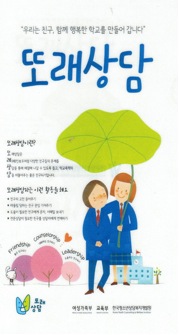_______________________________________________________________________________
Judy Tindall, Ph.D. Consults/Trains in South Korea Peer Counseling Program
Judith A. Tindall, Ph.D., Licensed Psychologist, National Association of Peer Program Professionals Trainer/Consultant and Psychological Network, Inc., recently returned from a December, 2013 trip to South Korea, where she conducted training for 150 S. Korean adults involved in peer counseling; met with officials regarding peer counseling in the U. S. and SouthKorea; keynoted a Peer Counseling conference of 500 youth and keynoted the Korean Counseling Psychology Association. South Korea has over 5,000 peer counseling programs in their schools with over 65,000 peer counselors. Korea Youth Counseling and Welfare Institute facilitated the events. The events
were supported by the Ministry of Gender Equality and Family and the Ministry of Education and the Institute.
Peer Counseling has been in existence in South Korea since 1995. The Institute supports the peer counseling program. Peer Counselors give counseling and emotional support
to peers in their schools. The training of peer counselors and their leaders is based on twenty different kinds of published teaching materials. As a result of the program's success, peer counseling clubs in schools have become more popular.
The focus in 2014 is to provide a comprehensive countermeasure implemented to prevent school
violence, and it furthers the expansion of the Peer Counseling Program. It co-operates with the Ministry of Gender Equality and Family, the Ministry of Education, the office
of education, the youth counseling and welfare centers, schools and Korean Youth Counseling and Welfare Institute. The peer counselors are in middle and high
schools throughout South Korea to eliminate school violence and create a healthy school environment.
Dr. Tindall trained adult peer professional counselors and teachers in skills so they can teach peer counselors how to resolve conflict, bullying prevention and suicide
prevention. The adult professionals also learned how their peer counseling program followed the National Association of Peer Program Professionals Programmatic Standards.
Dr. Tindall met with the officials of S. Korea and she described examples of peer programs in the U.S. and she learned about Peer Counseling in South Korea.
Bon-Young Khu, Ph.D., president of Korea Youth Counseling and Welfare Institute convened the meeting and made opening remarks. Three demonstration projects were highlighted at the elementary, middle and high school.
Dr. Mi Seo. Korean Youth Counseling and Welfare Institutereported on the evaluationof the three projects. As a result of peer counseling in their pilot programs, school
satisfaction changed, relationship skills increased, leadership skills increased, and attitudes changed. The focus in South Korea schools are to prevent bullying, reducesuicide, build friendship and leadership skills, help create a culture of empathy, and serve as mentors to younger students. The peer counselors also set up awareness days such as Apology day called “Apple Day", Complimentary Day called “Tree for
Compliment” where students use nice words.
At the Youth Conference, Dr. Tindall helped the peer counselors identify what helped them get into peer counseling, understand the impact of peer counseling on them and how they can use their skills to make a “world of difference”. They also learned how
peer counseling skills can help them in their adult life.
The Korean Counseling Psychology Association requested that Dr. Tindall discuss how peer counselors help to prevent and intervene in suicide. Suicide is the number
one cause of death in South Korea among youth. Some of the pressure youth feel to succeed in school can lead to suicide along with mental health issues. There is
tremendous pressure to succeed academically. 80% of the10th graders go on to college. They have the highest reading score of any civilized country.
New York Times (2011) quoted a statement of the KAIST (Korean Advanced Institute of Science and Technology University), student council released after the fourth suicide
in the school “Day after Day we are concerned into an unrelenting competition that smothers and suffocates us. We couldn’t even spare 30 minutes for our troubled
classmates because of all our homework…. We no longer have the ability to laugh freely.”
The work in South Korea was very interesting and many of the issues identified in South Korean Youth are also found in the United States. Peer Counselors by operating effective
Peer Programs that follow the National Association of Peer Program Professionals can make a difference in the schools with the utilization of counselors.
_______________________________________________________________________________
Copyright © 2023 Psychological Network, Inc. All rights reserved.
Managed by LBSC Group
Program Evaluation


